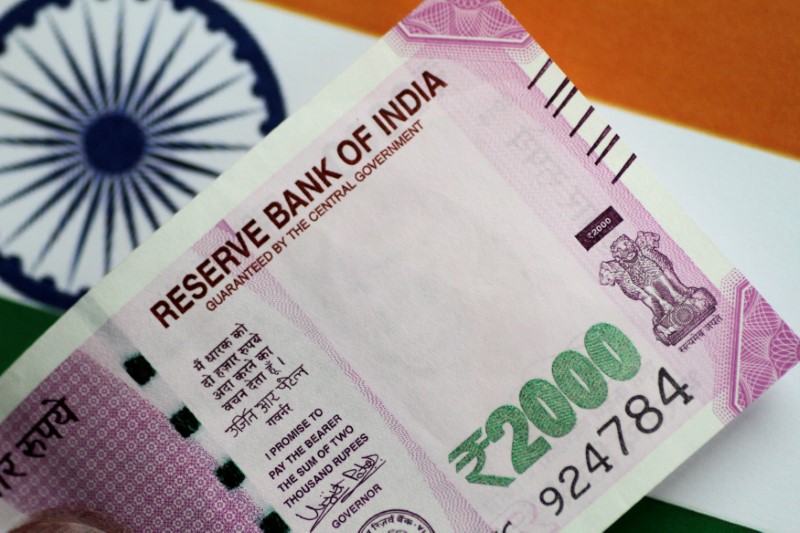* Indonesian rupiah at its lowest in a week
* Philippine peso firms 0.5%, equities down 1.7%
* Indian rupee strengthens 0.3%
* Bearish bets on most Asian currencies firm - Reuters poll
By Sameer Manekar
April 8 (Reuters) - The Indonesian rupiah led the decline
among most of Asia's emerging currencies on Thursday after a
proposal to expand the central bank's mandate got renewed support
from President Joko Widodo.
Equities in the region broadly edged higher, with India's
Nifty 50 .NSEI gaining nearly a percent in what would be a third
straight day of gains. Philippine shares .PSI fell 1.7% to mark
their sharpest fall in nearly three weeks, and ended a three-day
streak of gains.
Indonesia's rupiah IDR= , which backs some of the
highest-yielding debt in emerging markets, lost half a percent on
a report that President Widodo was pushing to expand Bank of
Indonesia's mandate to include economic growth and job creation.
Last year, his administration and some lawmakers fielded a
draft bill to expand the central bank's mandate, drawing concerns
among foreign investors - who hold a major chunk of the country's
debt - over greater government oversight of the central bank.
"These reports have caused concerns whether it will erode the
independence of the central bank in the way it manages monetary
policy, leading to the underperformance of the currency," Khoon
Goh, head of Asia research for ANZ said.
Analysts at Citi expect the rupiah to continue to underperform
due to seasonally higher imports and dividend and coupon payment
outflows over April and May, and have positioned themselves for a
weaker currency through options.
In March, the rupiah weakened 2%.
Bearish bets on most Asian currencies were also raised, a
Reuters poll showed, as investors contend with elevated U.S. bond
yields and an outperforming U.S. economy.
In India, the rupee INR=IN recovered some ground,
appreciating 0.3% after a sharp 1.5% fall in the previous session
following the central bank's announcement of a large bond buying
programme and decision to leave rates at record lows. While stocks fell in Manila, the peso PHP= strengthened 0.5%
after the Philippines reported its smallest trade deficit in three
months in February on the back of falling imports and a decline in
the slowdown of exports. "Expect the trade deficit to remain modest compared with
pre-COVID-19 averages, which should translate to a current account
surplus and near-term support for the peso," Nicholas Mapa, senior
economist, Philippines, at ING said.
The country also suspended the use of AstraZeneca (NASDAQ:AZN)'s COVID-19
vaccine for people below 60 years to investigate reports of blood
clots. HIGHLIGHTS:
** Indonesian 10-year benchmark yields fell 3.5 basis points
to 6.505%
** Tata Motors TAMO.NS and Tech Mahindra TEML.NS were the
top gainers on Nifty 50 index
** Taiwan stocks gain 0.7% to scale a fresh peak
Asia stock indexes and currencies at 0640 GMT
COUNTRY FX RIC FX FX INDEX STOCKS STOCKS
DAILY % YTD % DAILY % YTD %
Japan JPY= +0.11 -5.91 .N225 -0.07 8.25
China CNY=CFXS -0.09 -0.33 .SSEC 0.24 0.43
India INR=IN +0.23 -1.76 .NSEI 0.66 6.69
Indonesia IDR= -0.45 -3.54 .JKSE 0.38 1.34
Malaysia MYR= -0.11 -2.77 .KLSE 0.11 -1.53
Philippines PHP= +0.47 -1.09 .PSI -1.60 -8.33
S.Korea KRW=KFTC -0.08 -2.77 .KS11 0.19 9.39
Singapore SGD= +0.01 -1.51 .STI -0.06 12.31
Taiwan TWD=TP +0.04 +0.24 .TWII 0.66 14.89
Thailand THB=TH -0.35 -4.71 .SETI 0.12 7.53
